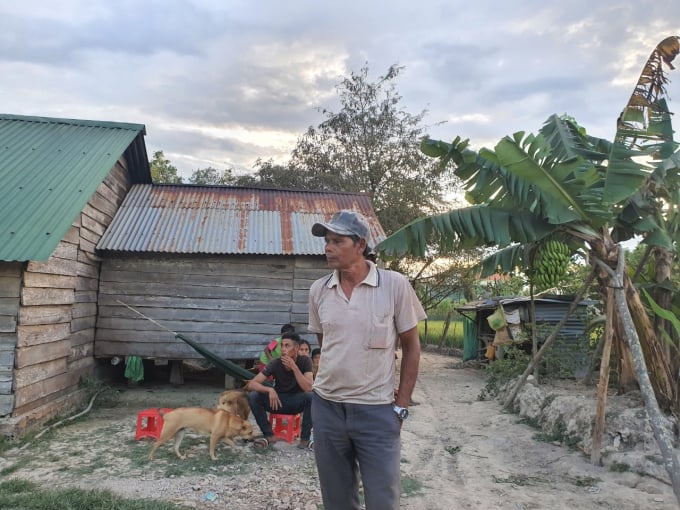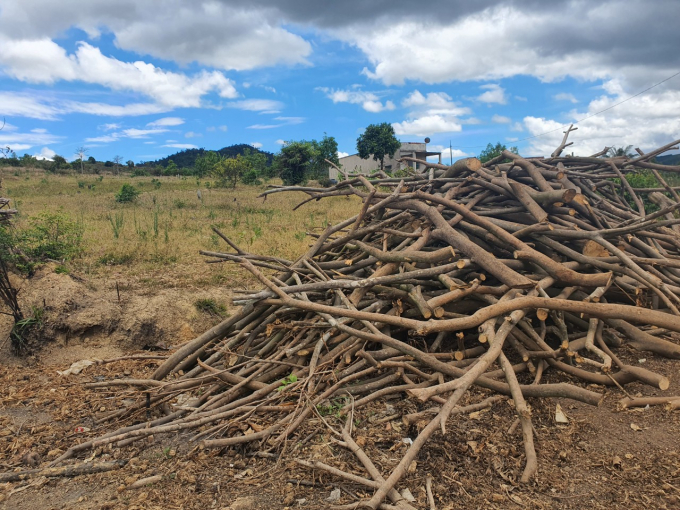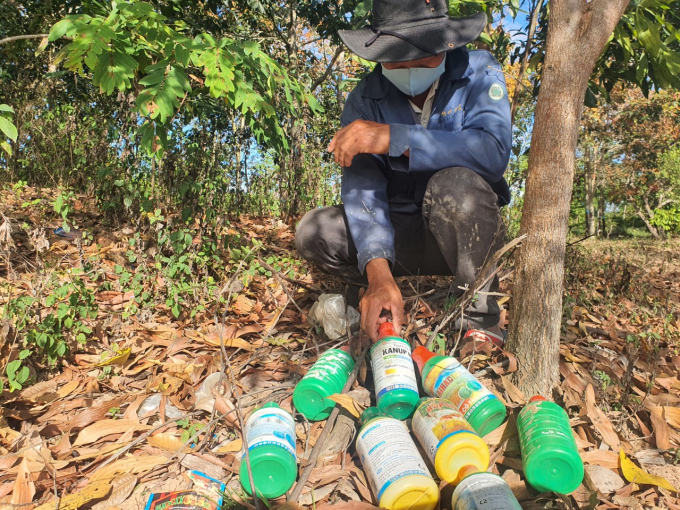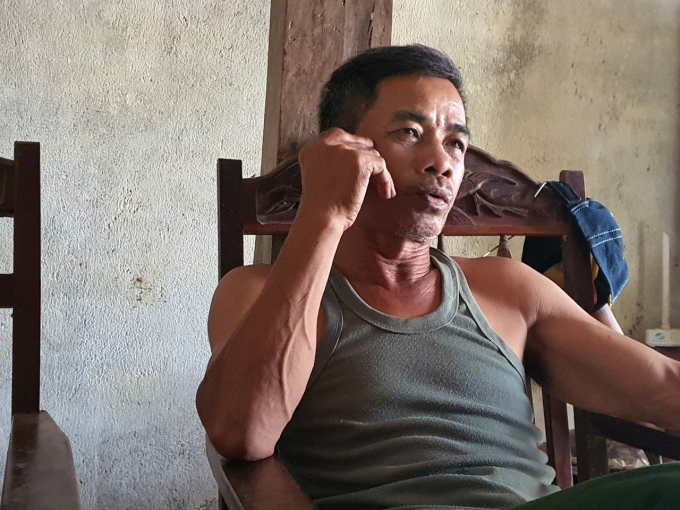November 21, 2025 | 22:31 GMT +7
November 21, 2025 | 22:31 GMT +7
Hotline: 0913.378.918
November 21, 2025 | 22:31 GMT +7
Hotline: 0913.378.918

The lives of people in Cu Elang become harder with each passing day. Photo: Hoang Anh.
In 2005, Cu Elang commune was separated from Ea O commune and quickly became a key agricultural production area of Ea Kar district (Dak Lak). Indigenous Ede people, free immigrants from the North and Central regions, came to build a new economy. This was a long march, a demonstration of human strength and wealth poured down, turning Cu Elang into a place of immense coffee, rubber, fruit trees and forestry trees.
As an inevitable rule: where there is demand, there will be supply, fertilizer and pesticide trading agents have massively sprung up in the new economic zone of Cu Elang. With models deeply investing in fertilizer, pesticides, seeds, and even daily necessities, it can be said that agent owners had fattened their bellies right on the backs of the poor.
Walk along the hills filled with coffee, rubber, and fruit trees in Cu Elang, which used to be basalt red soil that is now faded in white and hardened. The trees are shriveled, dry of life, and burned to death. The grass cannot even grow on this land.

The land in Cu Elang is becoming degraded and infertile. Photo: Hoang Anh.
Mr. Tran Van Thanh, Head of Cu Elang commune, said that this was the consequence of years of farmers following along the habit of chemical fertilizers, pesticides, and herbicides abuse which caused the land to degrade and become arid while trees and crops are constantly dead prematurely or unable to develop normally. In just one year, 200 ha of fruit trees in the commune were wiped out. The same went for coffee and other crops. “Everytime we plant new trees, they die. Even if they don’t die, they are still weak and wobbly. Nothing seems to work around here.”

Village chief Y Tim Eban of Ea Rok village next to piles of pesticide bottles and packages. Photo: Hoang Anh.
Village chief Y Tim Eban of Ea Rok village took us to his family’s 2 ha wide coffee field. Like most farmers in Cu Elang commune, his family had this farming habit of overusing pesticides. The coffee field was filled with used pesticide bottles and packages, and all of them are toxic chemical pesticides. Even herbicides containing the active ingredient Glyphosate which had been banned in Vietnam remained scattered in the coffee garden of the village chief.
“I know that these chemical fertilizers, pesticides, herbicides, and pesticides are very toxic - toxic to the soil, people, and environment. But there are too many weeds and pests. If you don't use those drugs, what would you use? For fear of the rice being unable to grow, we spray. For fear of grass growth, we also spray. For fear of pests attacking coffee and passion fruit trees, we spray again. People here do not actually have money to buy fertilizers and pesticides. All of them have to borrow money from agricultural supply dealers. All the debentures are handwritten and signed between two parties."
The family of Mr. Y Tim Eban also had to grow rice and coffee in the form of cooperation with such “investors”. For each 2 ha of fields the family had to fertilize nearly 1 ton of fertilizer. Combined with the cost of pesticides, seeds, labor and other investments, they worked to the bone, but still not enough to put food on the table. Like this year, fertilizer prices went up to nearly VND 20 million/ton. Just thinking about it scared the village chief dreadfully, especially when the loan from Nga Xuyen trading agent for family investment was being charged an interest rate of VND 25,000/VND 1,000,000/month.
“The land is becoming more and more barren, crops are often attacked by pests and diseases, trees wither and die while input prices keep increasing like this, it would not be strange to see the villagers assigning houses and fields to pay off debt, or leaving their homeland, struggling to make ends meet,” said Mr. Y Tim Eban in a desperate tone.
“The earth trap - the human trap” is only a part of the problem. The consequences of chaotic fertilizer and pesticide business and chemical inputs abuse are pushing farmers to the end of the road.
The family of Mr. Nguy Van Bac (60 years old) in Ea Kar is a prime example. A couple with four children, working hard day and night to the point of “the land don’t rest, and neither do these hands”, but in the end they still have to assign houses and fields to Trung Lien agricultural inputs trading agent.
Mr. Bac's family used to have 4 ha of sugarcane and coffee plantations. The matter didn’t seem too severe at first, only borrowed from agents to invest in production, but then they had to sell their houses and parts of the field. Even so they still could not pay off the debt.
“Part of it is because people's awareness is not high, but another part is because the quality of input materials is not guaranteed. Fake and poor-quality fertilizers and pesticides are all over the market, making the previously fertile land tum into dead land. Us farmers are at our wits’ end.”

Mr. Bac’s family members are all hardworking, but the traps from trading agents are too hard to fend off. Photo: Hoang Anh.
Not only in Cu Elang but many other lands in the Central Highlands region are also dying because of the problem of chemical fertilizer and pesticide abuse. Farmers are struggling to change the crops, but the chance to save this situation is near zero. There seems to be no suitable crop because the soil has already been severely poisoned. The most affected areas are Ea Hleo, Krong Pak, Cu'Mga, Ea Kar (Dak Lak) then Dak Song (Dak Nong), Chu Se (Gia Lai).
Translated by Samuel Pham

(VAN) Results from the Sustainable Durian Model Project in Dak Lak have confirmed the critical role of Yara Viet Nam in transferring advanced nutritional solutions to farmers.

(VAN) In Tuyen Quang province, livestock farmers have introduced effective models and innovative practices that significantly strengthen African Swine Fever prevention and control efforts.

(VAN) This is the study conducted by IRRI and Can Tho University on the rice straw value chain in Mekong Delta showing an economic potential of more than 6.6 trillion VND/year.

(VAN) By participating in cooperative economics, many farmers in Tay Ninh have overcome hardship, mastered clean dragon fruit cultivation techniques.

(VAN) The crossbreeding program in the former Binh Dinh province (now part of Gia Lai) has shown signs of decline, and urgent measures are needed to revive it and sustain past achievements.

(VAN) The agricultural sector agreed on a roadmap to pilot the MRV protocol and expand low-emission rice production from the 2025-2026 winter-spring crop.

(VAN) Agricultural extension officers in Quang Ninh do more than transmit knowledge; they have become a steadfast support system for farmers on the path to sustainable agricultural development.